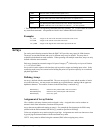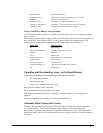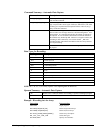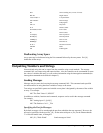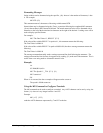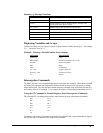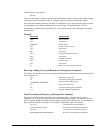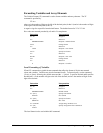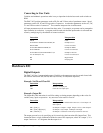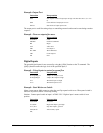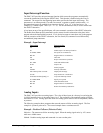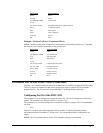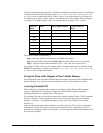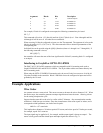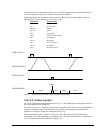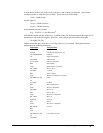
140 • Chapter 7 Application Programming DMC-3425
Converting to User Units
Variables and arithmetic operations make it easy to input data in desired user units such as inches or
RPM.
The DMC-3425 position parameters such as PR, PA and VP have units of quadrature counts. Speed
parameters such as SP, JG and VS have units of counts/sec. Acceleration parameters such as AC, DC,
VA and VD have units of counts/sec
2
. The controller interprets time in milliseconds.
All input parameters must be converted into these units. For example, an operator can be prompted to
input a number in revolutions. A program could be used such that the input number is converted into
counts by multiplying it by the number of counts/revolution.
Instruction
Interpretation
#RUN Label
IN "ENTER # OF REVOLUTIONS",N1 Prompt for revs
PR N1*2000 Convert to counts
IN "ENTER SPEED IN RPM",S1 Prompt for RPMs
SP S1*2000/60 Convert to counts/sec
IN "ENTER ACCEL IN RAD/SEC2",A1 Prompt for ACCEL
AC A1*2000/(2*3.14) Convert to counts/sec2
BG Begin motion
EN End program
Hardware I/O
Digital Outputs
The DMC-3425 has 3 uncommitted outputs. Each bit on the output port may be set and cleared with
the software instructions SB (Set Bit) and CB(Clear Bit), or OB (define output bit).
Example- Set Bit and Clear Bit
Instruction Interpretation
SB3 Sets bit 3 of output port
CB2 Clears bit 2 of output port
Example- Output Bit
The Output Bit (OB) instruction is useful for setting or clearing outputs depending on the value of a
variable, array, input or expression. Any non-zero value results in a set bit.
Instruction
Interpretation
OB1, POS
Set Output 1 if the variable POS is non-zero. Clear Output 1 if
POS equals 0.
OB 2, @IN [1] Set Output 2 if Input 1 is high. If Input 1 is low, clear Output 2.
OB 3, @IN [1]&@IN [2] Set Output 3 only if Input 1 and Input 2 are high.
OB 3, COUNT [1] Set Output 3 if element 1 in the array COUNT is non-zero.
The output port can be set by specifying an 8-bit word using the instruction OP (Output Port). This
instruction allows a single command to define the state of the output port, where 2
0
is output 1, 2
1
is
output 2 and so on. A 1 designates that the output is on.



